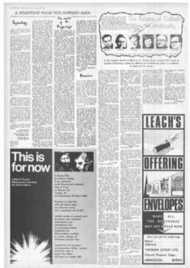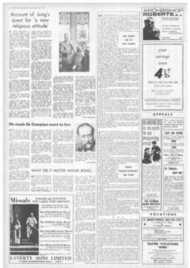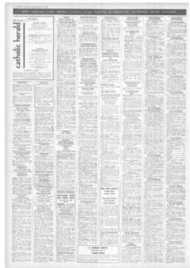Page 2, 18th March 1966
Page 2

Report an error
Noticed an error on this page?If you've noticed an error in this article please click here to report it.
Tags
Share
Related articles
The Future Of Catholic Christianity
Herald Anti-semitism? Surely Some Mistake
When The Herald Editor Went To Jail In A Rolls
Casting His Mind Back Not Quite 100 Years, The Catholic
The Davis Crash Victims
In the Catholic Herald of March 4, Fr. Charles Davis
reviewed The Future of Catholic Christianity, edited by Michael de la Bedoyere. Here is a selection of replies to his review.
Sir,—Fr. Davis is on strong grounds in criticising fundamentally the general tenor of the contributions to The Future of Catholic Christianity. However his remarks on Andrew Boyle's essay betray a lack of insight arising from a failure to place ideas in a social context.
Fr. Davis is unable to understand Mr. Boyle's agitation at the inadequacy of many of our Bishops. "The Church is not the exclusive possession of the Bishops, the laity themselves are the Church," he tells us complacently. Those who find themselves frustrated by the present situation have only to realise this fact. The matter is a purely personal problem that must be solved by individual adjustment.
Unfortunately however, these newly-arisen concepts of the Church's nature appear largely in the realms of progressive theory and do not seem to have much relation to one's day-today experience. This gives rise to a tension that cannot be solved in an interior way by individuals who have become conscious of the situation.
Fr. Davis goes astray by seeing the problem in terms of intellectuals wanting to "think for themselves". He does not seem to realise that creative thinking is essentially social in its nature and oriented towards action. What is demanded is a common freedom of thought and action without which many are bound to feel constricted and the Church as a whole frustrated.
The question is absolutely fundamental to the renewal of the Church and admittedly will not be answered by simply "knocking" Bishops. On the other hand the appeal to dogmatic tradition in isolation from a revitalised believing community is not enough.
What is required is radical change in the whole mentality of the Church interacting with the reformation of her structures and institutions in which the episcopacy holds a key position.
K. J. Fleet Chilwell, Nottingham.
Sir,—As evidence of the destructive nature of my contribution to The Future of Catholic Christianity your reviewer, Fr. Davis, quotes my words: "In this theological eruption many pronouncements concerning dogma and morals . . are being exploded. The elaborate structure of theological and moral doctrine crumbles before our eyes."
He does not inform your readers that I am here assenting to a statement quoted from the Dominican theologian Cornelius Ernst writing on Karl Rahner in the CATHOLIC HERALD of March 6, 1964. These are his words: "It must be a matter of common knowledge that Catholic theology" (the enunciation surely of theological doctrine) "today is going through a profound upheaval. Areas of apparent stability and solidity may still be found, the hard crust which resists the volcanic eruption, but it is improbable that the resistance can last much longer."
And in the course of his article the writer speaks of the "upheaval in theology" of which Kari Rattner is at the heart. Fr. Davis should have directed his strictures at these distinguished theologians rather than a lay essayist seeking to establish his faith on the most solid and enduring foundation, man's experience of God.
(Prof.) E. I. %akin Torquay.
Sir,-Fr. Davis reminds us that the dogmatic principle is fundamental to Catholic Christianity. Quite so, and that is why it is important for us to understand what he means by it. Here, I confess, I am puzzled.
Fr. Davis tells us that a dogma is a final, absolute, irreversible, never to be contradicted decision on a question concerning faith and morals. He says: "The Church answers a question about revelation with an explicit and irrevocable statement."
This of course, is the old "Oracle of God" view, and whether we think it tenable or not, it is at least comprehensible and consistent. I do not, however, understand how it can be reconciled with his ideas about the mutability of dogma and his insistence, both here and elsewhere. on the "transcendence of revealed truth, and the imperfect,
faltering, and analogous character of any human statement of it". (Clergy Review, July, 1963).
If the Church's statements about revealed truth are so imperfect and faltering it is difficult to see how at the same time they can be, to quote Fr. Davis, final, absolute, irreversible, explicit, irrevocable, and never to be contradicted.
If the Church really possesses the power to answer questions about revelation with explicit and irrevocable statements, why, in the same review where he asserts this, does Fr. Davis refer to "the present confusion about the nature of Christian moral teaching"? And what is the meaning of these "hesitationsand uncertainties" among the faithful to answer which he wishes a more satisfactory book could have been written?
The fact is that these hesitations and uncertainties are plainly the consequence of the gradual breakdoWn, not of the dogmatic principle as such, but of a too juridical and superficial understanding of it which Fr. Davis seems at the same time both to defend and to attack.
"If way to better there be, it exacts a full look at the worst." There will be no way to the better unless and until we have sufficient faith in the future of Catholic Christianity to stop shuffling and look our difficulties squarely in the face. Magdalen Coffin Fordcombe, Kent.
Sir,—I have not yet read the book The Future o/ Catholic Christianity, but I have read Bernardine Bishop's contribution to this symposium, and have a typescript copy of it before me.
Your reviewer says that this essay "confirms all the worst fears aroused by the title" and describes it as "yet another addition to an already extensive mythology".
I do not see why the title, "The Future of the Female" should arouse any fears; and what is meant by "mythology" in this context is not clear.
Mrs. Bishop's essay is a thoughtful examination of the predicament in which women find themselves in the modern world and in the contemporary Church, which would seem to derive in part from the lack of a proper synthesis between their mental powers as recently developed and their unchanging femininity. This is a question of importance, surely.
Mrs. Bishop seems to me to have written a valuable short study of this problem; and to have succeeded in bringing some light into corners where there is usually total darkness; for instance, into the matter of the incompatibility, which she upholds, between women and the priesthood.
In his brief dismissive sentences I think your reviewer has failed to appreciate the merits of this carefully and soberly written study by one of the most gifted of our younger Catholic writers.
Brocard Sewell, O.Carm. Aylesford Priory.
Sir,—In his cursory dismissal of my small but closely reasoned contribution to The Future of Catholic Christianity, Fr. Davis proves himself to be either a careless or a surprisingly prejudiced reviewer. Charity would make me wish he were the former ; honesty compels me to think he is the latter.
My complaint is not that he denied me the elementary courtesy of reading and trying to understand what I wrote. It is rather that he distorted its substance and significance in a manner which does less than justice to the intelligence of your readers—or, presumably, his own.
Andrew Boyle London, S.W.15.
Sir,—Fr. Davis' devastating review of The Future of Catholic Christianity raises an important question. Since the aggiornUMento became an awakening force the laity has been constantly asked to take
an active part in the Church's life and development. They arc, so we are told, the Church.
Thanks to the initiative of Michael de la Bedoyere, ten well-known Catholics expressed their views on subjects for which each one was particularly suited. One would have expected a fair and encouraging review. But the • opposite happened.
Fr. Davis' review has an inquisitorial ring. It is as if he were bent on stamping out all Catholic experience that does not come within the framework of a professor of dogmatic theology. He finds fault with all the contributors, only admitting the presence of "good patches". What sticks in one's mind is that it is a "disas
trous" book and a "deplorable publication".
Could the book not have been sent for review to somebody more ready to listen to and to learn from the laity? They have, after all, first-hand knowledge of aspects of life from which Fr. Davis, both as priest and professor, is protected.
Small wonder that he had difficulty in integrating into his philosophical system certain views he comes across in the book, and that he regards suppression and rejection as the only answer. And this makes one rather sad when thinking about the future of Catholic Christianity.
blog comments powered by Disqus











